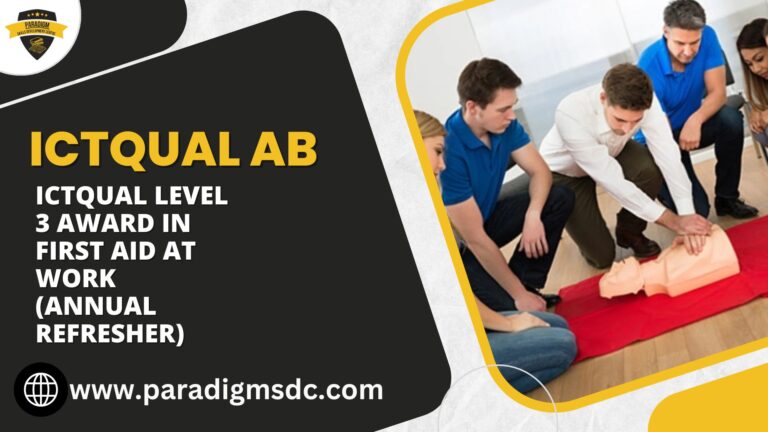Course Introduction
Phlebotomy, the practice of drawing blood for medical testing, transfusions, or research, is a crucial skill in the healthcare industry. The ICTQual Level 3 Award in Fundamentals of Phlebotomy is designed to provide comprehensive training for individuals seeking to develop expertise in this vital field. This course equips students with the knowledge and practical skills required to perform phlebotomy procedures safely and effectively, ensuring high standards of patient care and contributing to accurate medical diagnoses.
Course Overview
The ICTQual Level 3 Award in Fundamentals of Phlebotomy offers an in-depth exploration of phlebotomy techniques, safety protocols, and patient interaction. Through a combination of theoretical learning and hands-on practice, students will gain the confidence and competence needed to excel in a clinical setting. The course is structured to cover essential topics, from understanding the anatomy and physiology related to phlebotomy to mastering the various methods of blood collection.
Course Study Units
- Introduction to Phlebotomy
- Anatomy and Physiology for Phlebotomy
- Phlebotomy Techniques and Procedures
- Health, Safety, and Infection Control
- Patient Interaction and Communication Skills
- Specimen Handling and Processing
- Quality Assurance and Legal Requirements
- Emergency Procedures and Complications Management
- Professional Development and Career Planning
Learning Outcomes
Upon completing the ICTQual Level 3 Award in Fundamentals of Phlebotomy, students will be able to:
Introduction to Phlebotomy
- Understand the role and importance of phlebotomy within the healthcare system.
- Identify the responsibilities and duties of a phlebotomist.
- Gain a foundational understanding of healthcare environments and laboratory operations.
2. Anatomy and Physiology for Phlebotomy
- Comprehend basic anatomy and physiology relevant to phlebotomy.
- Explain the structure and function of the circulatory system.
- Describe the composition of blood and its various functions.
3. Phlebotomy Techniques and Procedures
- Master venipuncture techniques, including equipment selection and site identification.
- Perform capillary sampling methods such as finger stick and heel stick procedures.
- Handle difficult blood draws with appropriate techniques.
- Follow proper handling and disposal protocols for sharps and biohazard materials.
4. Health, Safety, and Infection Control
- Adhere to occupational health and safety guidelines.
- Implement infection control principles and best practices.
- Utilize personal protective equipment (PPE) correctly.
- Prevent needlestick injuries and other workplace hazards through established procedures.
5. Patient Interaction and Communication Skills
- Communicate effectively with patients to ensure clear understanding and comfort.
- Manage patient anxiety and provide reassuring support.
- Navigate ethical and legal considerations in patient interactions.
- Maintain confidentiality and protect patient information.
6. Specimen Handling and Processing
- Label, handle, and transport blood samples properly to ensure integrity.
- Interpret laboratory requisitions and complete necessary documentation accurately.
- Implement techniques to prevent sample contamination and ensure diagnostic accuracy.
7. Quality Assurance and Legal Requirements
- Apply quality control procedures in all phlebotomy activities.
- Understand and comply with legal and regulatory requirements related to phlebotomy.
- Maintain accurate and thorough documentation and records.
8. Emergency Procedures and Complications Management
- Recognize and manage complications that may arise during blood collection.
- Execute emergency procedures effectively in response to adverse reactions.
- Provide post-phlebotomy care and instructions to patients.
9. Professional Development and Career Planning
- Explore various career paths and opportunities in phlebotomy and related fields.
- Develop a professional resume and prepare for job interviews.
- Identify opportunities for continued education and specialization to advance your career.
Course Benefits
- Comprehensive Training: Gain a well-rounded education in phlebotomy, covering both theoretical knowledge and practical skills.
- Career Advancement: Enhance your qualifications and increase your employability in the healthcare sector.
- Patient Care: Learn to provide high-quality care and ensure patient comfort during phlebotomy procedures.
- Safety First: Understand and implement essential safety and infection control measures.
- Professional Development: Develop effective communication and ethical practices to excel in your role.
Who is This Course For?
The ICTQual Level 3 Award in Fundamentals of Phlebotomy is ideal for:
- Aspiring phlebotomists seeking to enter the healthcare field.
- Healthcare professionals looking to expand their skill set.
- Medical assistants and nurses aiming to enhance their qualifications.
- Individuals interested in pursuing a career in medical research or laboratory work.
Future Progression
Upon successful completion of the ICTQual Level 3 Award in Fundamentals of Phlebotomy, students can pursue further education and training opportunities, such as:
- Advanced courses in phlebotomy and related healthcare fields.
- Specialization in areas such as pediatric or geriatric phlebotomy.
- Certification programs to become a certified phlebotomy technician.
- Higher-level qualifications in healthcare and medical sciences.
By completing this course, you will be well-prepared to embark on a rewarding career in phlebotomy, contributing to the essential work of healthcare providers and making a positive impact on patient care.







